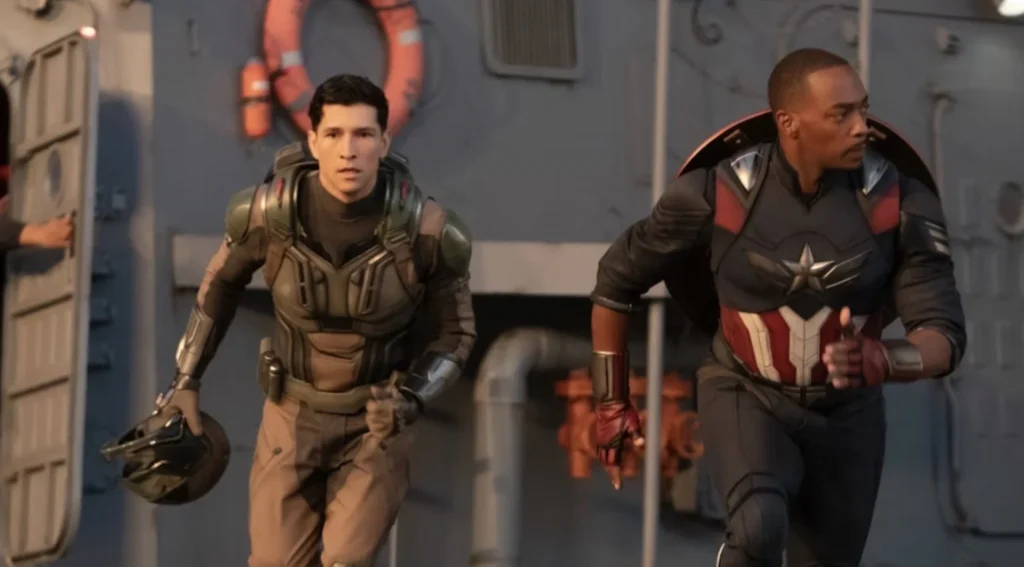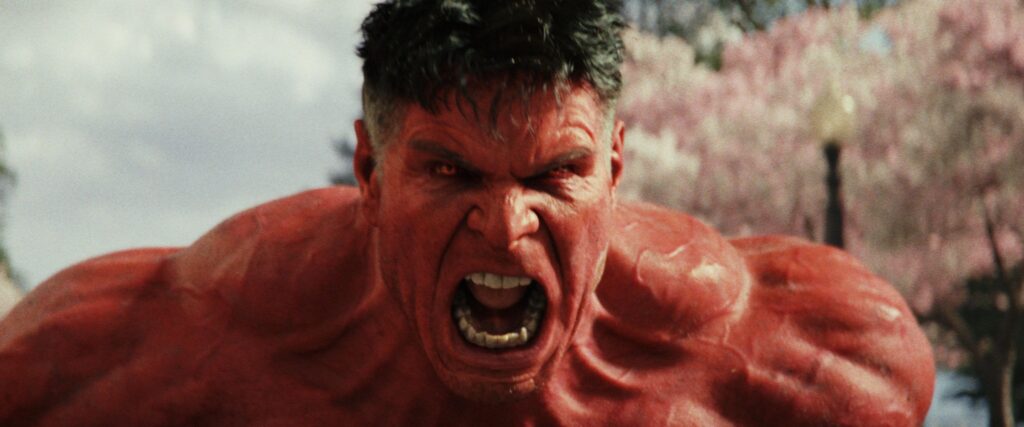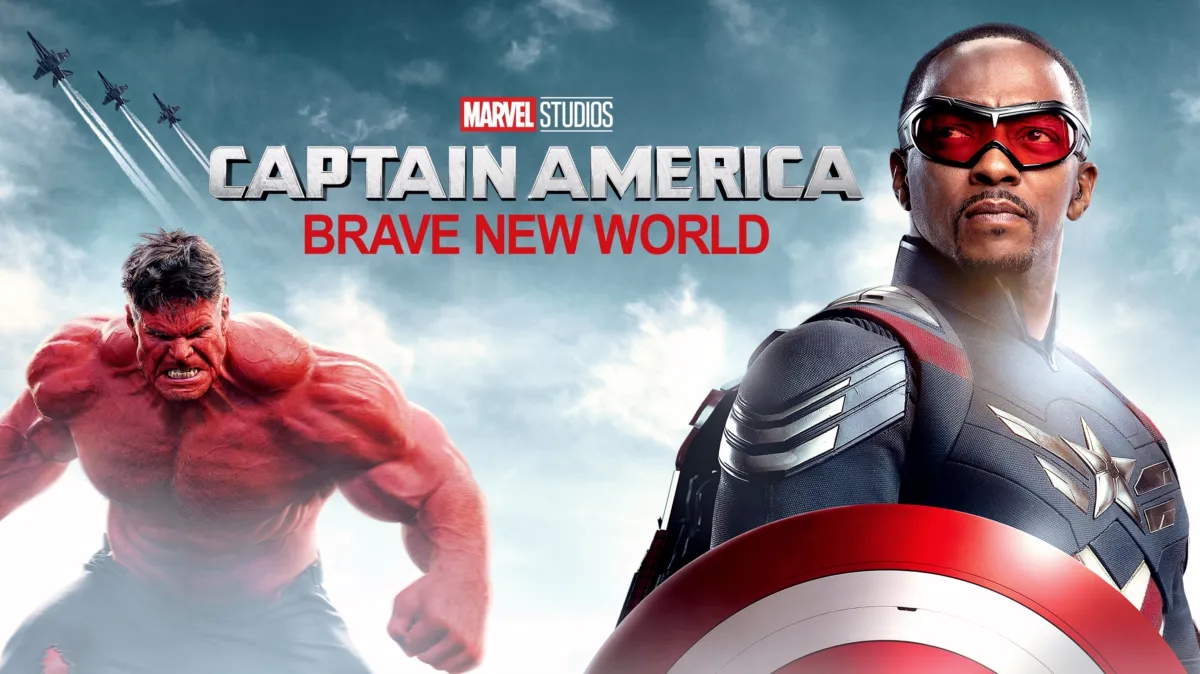The start of 2025 saw the release of Marvel Studio’s, Captain America: Brave New World in cinemas across the globe. With a $180 million budget and big name actors, including Anthony Mackie, Danny Ramirez and Harrison Ford, it should have been a well-rounded success. But critical and public reviews were less than impressed with the film, having only received a 5.6/10 on IMDb, and only 46% on Rotten Tomatoes.
The film follows the story of Sam Wilson (Anthony Mackie) as the new Captain America, as he embarks on his first mission since taking up the mantle. After a series of heated arguments with the newly elected president Thaddeus Ross (Harrison Ford), Wilson finds himself in a classic race against time to save the day and defeat the enemy. The audience watches on as Wilson works with his good friend The Falcon (Danny Ramirez), as they use high- tech gear to fight off their enemies, communicate with their trusted sources and ultimately discover who the mastermind is behind the attacks on the President and global peace.

The film combines all the classic elements of a typical Marvel Production; leadership tensions, bold heroisms, dramatic fight scenes, military intervention and supernatural forces and characters. So why then did this film fail to thrill audiences in the ways people have come to expect of Marvel productions?
I think there is no singular cause that has led to the downfall of Marvel movies in recent years, but is instead the combination of the shifting artistic and storytelling direction the studio has taken in recent years, alongside their attempts to retain the same level of popularity they once had, without changing their approach.
Captain America, as originally shown within the Marvel Cinematic Universe (MCU) was played by Chris Evans, and followed the story of Steve Rogers’ initial struggles to participate in the second World War, to his then eventual heroic successes after agreeing to take a Super Soldier Serum, that enhanced his physical and mental qualities. The original character and subsequent movies he was seen in, had a very real and human element to them, that enabled audiences to deeply and emotionally connect with the characters on screen. Rogers’ Captain America built a legacy not only within the MCU, but also within many people’s actual lives. Hence the decision to give Wilson, an already established character within the MCU, the role of adopting this iconic name and image, was setting him up for failure right from the start. This is because despite his acting skills, Mackie’s version of Captain America was never going to resonate with audiences in the same way Evans’ originally did, as people were always going to compare the two, despite them being fundamentally different people.
The plot of Captain America: Brave New World was rushed, poorly written, relied on old ideas and had a boring villain, despite the nearly 2 hour run time. There were too many shallow and poorly constructed characters that failed to establish a strong emotional presence within the film. It was this crucial lack of deep personable and emotional characters that made the film feel lacklustre and stale. The heavy reliance on impressive, albeit unrealistic weaponry from Wakanda, also served to further distance audiences from the story. It felt as thought they were trying to compensate for Sam Wilson not being Steve Rogers, by unsuccessfully filling the gap with exotic tech.
The dissatisfaction about the film has been shared across numerous review websites too, including here and here, with audiences expressing their disappointment at the lack of clarity and direction of the film itself, but also within the context of the entire MCU plot. The reliance on the old Red Hulk concept in the film only further complicated the plot lines of the MCU, rather than added to them.

This failure to establish new ideas, characters, or plots within the franchise has become a recurring theme for Marvel. Since Avengers: Endgame’s release, audiences have been growing increasingly frustrated at the insipid work being produced. In an interview with Variety, CEO Kevin Feige discusses how: “After “Endgame,” the company entered into a period of “experimentation” and “evolution” of the kinds of movies it was making” (Variety, 2025). With now no clear direction of where the franchise is trying to go.
The significant rise in streaming platform popularity also hasn’t helped Marvel to re-establish the popularity it once had. With the attempt to keep up with the demands of the platform by producing cheaper and quicker series, rather than focussing on major feature films. “Marvel’s dramatic increase in volume spread [them] far too thin for its relatively small team of executives to keep up.” (Variety, 2025). This focus on new mini-series and subplots meant that new ideas have failed to enter the scene in favour of speed, rather than quality, leaving audiences fatigued and fed up with the lack of thrilling stories and heroes they once could expect of a Marvel Studios production.
While the individual actors had strong performances, poor writing and a flavourless plot meant that Captain America: Brave New Word was destined for failure. Sam Wilson has plenty of future potential within the franchise, but if Marvel hopes to achieve the box office success it once did, they need to seriously reconsider their approach in their upcoming work…
